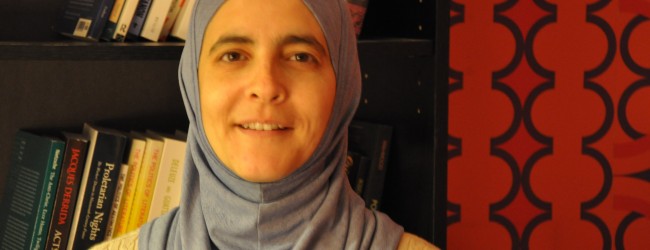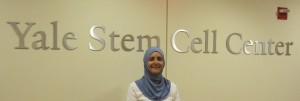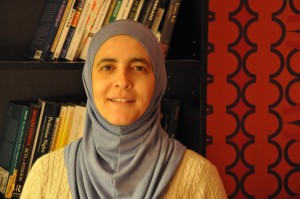
By the Editors of localhost/muslim
Dr. Rana Dajani obtained a Ph.D. in molecular biology from the University of Iowa, USA; a Fulbright alumnus, she is currently Assistant Professor and Former Director of the Center of Studies at the Hashemite University, Jordan. Her research focuses on genome-wide association studies concerning diabetes and cancer in ethnic populations in Jordan. Other research includes signaling transduction, stem cells, and bioinformatics.
She is a strong advocate of the theory of biological evolution and of its compatibility with Islam. On the broader horizon, Dr. Dajani has developed a community-based model and philosophy, “We Love Reading (WLR)”, to encourage children to read for pleasure for which she received the Synergos award for Arab world social innovators in 2009, membership of the Clinton Global Initiative 2010, and a place in the upcoming book Innovation in Education: Lessons from Pioneers Around the World, funded by Qatar Foundation.
In her article “How women scientists fare in the Arab world,” published in Nature in November 2012, Dr. Dajani argues that true equality for women scientists requires recognition of their family roles as well. She feels that due to family commitments, women are unable to network, hence resulting in a reduction of the number of opportunities, due to a lack of mentoring and networking. For this reason, she feels that mentoring projects are required in the Arab world so as to support women in distilling both their personal and professional duties.
While harping on the importance of science education for women, Dr. Dajani talks about the role of the Arab Spring in promoting education, in her article, “The Arab Spring offers hope but no quick fix,” published in Nature in September 2011. She feels that though such revolutions in Libya and elsewhere have opened pathways for the advancement of science in the Arab world, yet there is a long way to go before science education can truly flourish in this part of the world. Indeed, her emphasis on the promotion of education is immense and her philosophy entails that education in the Arab world must equip students with more than just textbook learning, as mentioned in her article, “Universities must inspire students as well as teach,” published in the October 2013 issue of Nature.
In this exclusive interview with localhost/muslim, she dives deep into her belief, convictions, and experience as a woman scientist working in the Muslim World towards promoting greater role of women in science to come up with a passionate rebuttal of a systematic bias against women in the profession:
localhost/muslim (MSC): Why, in your opinion, are women generally discouraged and/or criticized for studying science and/or pursuing a career in science?
Ra’na Dajani (RD): To my knowledge and from my experience, this trend of discouraging women to study or pursue a career in science, in dying out. The reason for past discouragement of women to study science, was based on the preconception, that women should study something useful for their future lives, which most of the time is limited to the home. If what they study was not related to their future, it was considered a loss of time and money. Women were not part of the work force, so there were no career options.
When the economy made it essential that the women workforce was needed, the concept then became to work for money and not for pursuing a career or a dream. Women were encouraged to study, so that they could provide an income for their families as life was getting increasingly expensive, or otherwise, in the case of being unmarried or divorced, the woman could survive on her own without any form of dependency. Yet another viewpoint is, that many believe women work not out of pursuing a dream or being ambitious, but because it is better than merely sitting at home. This concept is alien but is worth studying.
The times of the Islamic civilization saw a boom in Muslim women working in the intellectual arena as, there are over 8000 Women scholars as documented. So what is the issue? The issue is not ‘fewer’ females in science, the issue really is the ‘less’ education for females in general. Choosing science or humanities is not the issue either. In reality, the issue is not only how men perceive women, but how women perceive themselves. Why is this important you may ask? It is important because if the mothers respect the image of women, then only will they bring up the next generation to view women in the same light.
Another issue that may often come up, is how a working female may be able to strike a balance with her family life. Her motherhood role is considered the most important in the Islamic and Arab world and I agree with that. The west has imposed a view of belittling/undermining the role of a mother. It should be counted as part of the GDP of a country. This skewed view has been imported into our culture, resulting in chaos and dissatisfaction. The solution lies in looking at the issue through our lens. In order to do that, we need social scientists from our part of the world to research. Unfortunately, we don’t have any. All our smart scholars are in basic science, medicine and engineering. What we don’t understand, is that both parts of the brain are needed, to weave the fabric of society.
MSC: When you were opting for science in your studies and/or your career, did you receive criticism from your support system (family, friends, relatives etc)? Please describe your experience.
RD: I was encouraged to study science and to pursue it as a career because my father was a physician and my mother was also highly educated and lived in the West. We are actually eight sisters, all of who pursued a career in science, except one, who obtained a Masters in theology. They are highly devoted Islamic people and there was never a conflict between Islam and studying science. The issue was how to strike a balance between career and family life, which is a world related issue and not particular to the Islamic world, as we have made it out to be.
Most importantly, however, is the support I received from my husband. We had four children when we decided to go as a family to the US, for me to finish my PhD. My husband left a successful career in the Air Force and the whole family moved. Later, as I progressed in my career, evermore the mentor, he was seminal to my success as a scientist and entrepreneur. I believe for a women to succeed in her career as a scientist, she needs a partner who believes in the importance of her work and her potential to make a difference. They both work together to be change makers in the community, sharing responsibilities in a compatible and complementary fashion. In this way, he becomes a role model for other males in the community.
In the community I live and teach as a professor, families are adamant to get their girls into medicine, science etc. as opposed to humanities. However, I see a reversal of trends in Jordan at least, and I would say the Arab world in general, where all our intelligent high achieving females, and for that matter males, go into sciences and engineering, rather than humanities. This is worth researching, so as to learn the thesis behind it, in an effort that, other communities can learn from this inquiry and develop a strategy for encouraging women to pursue science. Based on statistics, the percentage of females in sciences is over 60% at universities in Jordan (article in Nature).
I believe the issue is more complex than we think. One important thing to keep in mind is, that we are adopting the Western perspective, view and history, in analyzing the issue of science. I believe this approach is flawed and biased, right from the beginning.
The concern is that you have low numbers of females in higher academic positions, but this has its reasons for example, we don’t have PhD programs in the Arab world so a woman has to travel abroad to get a PhD and this has its challenges (living alone for a long period, money etc).
 MSC: When a women opts to pursue a career in science, many professional organizations assume a biased behavior and tend to favor men over women in their hiring process. What is your opinion in this regard?
MSC: When a women opts to pursue a career in science, many professional organizations assume a biased behavior and tend to favor men over women in their hiring process. What is your opinion in this regard?
RD: My opinion is when you are good, you are good. Period. No one will hire a male who is less capable, than a woman. It is how you look at it. One should think neutral and explain things in a neutral way.
You will be surprised to know, that in the Arab world, females are considered to be more hardworking than men as well as higher achievers. The recent study that came out in PNAS, divulged that scientists favored males over females. I believe that the case in the Arab world is different and worth studying.
The Islamic and Arab worlds have bias in laws and so on, only because these laws were drawn/imported from Western organizations. Hence, you can very well see where the bias is coming from.
In a gist, the whole Islamic and Arab society’s view point of women is contaminated by Western philosophy, whether we like to admit or not.
MSC: The media rarely puts women scientists in the spotlight. Any recommendations to change these practices, as well as the society’s attitude in general, towards women being in science?
RD: Yet again, we witness the seepage of a western attitude. If we look towards Islam, we see that this is non existent. Actually it was never an issue until the West made it an issue, because they are biased. As I mentioned earlier there were 8000 Women scholars during Islamic history. These are the ones documented, so we can just about imagine how many were not.
What we have from our history is simply, what the West put on a pedestal. The Western culture is biased against women and thus will not acknowledge them in their own culture, so why should they acknowledge them in our culture/history? We don’t know our history because either we don’t have sufficient historians or we don’t make an effort to read through available material. A primary reason for this is that the majority of our intellectuals , have historically belonged to the fields of engineering and medicine. In addition, history is written by winners and the winners for the past few hundred years were all those pertaining to the West. We are falling into the trap of blind conformity, were the West is leading us according to their views and perspective, whilst creating problems for us that don’t exist and suggesting solutions that don’t work. These subtle differences are there and are very obvious to the uninitiated and naïve. Jane Fonda on her visit to the Arab world, said that she was surprised on the confidence exerted by Arab women and realized that our problems were different from Western women. The Western woman has to work on herself from the inside, while the Arab woman has to work on herself from the outside. Actually, this is an example (of how women are viewed), of many issues that the West has imposed upon other cultures it has colonized, not solely limited to the Arab muslim world, but also the Indian culture and several others. This is worth researching as well.
 MSC: Do you think the Muslim female community has any ‘Muslim female scientist’ role models to look up to? Who and why?
MSC: Do you think the Muslim female community has any ‘Muslim female scientist’ role models to look up to? Who and why?
RD: Yes they do, both in history and modern times. It is just that we don’t celebrate role models in general, unless they are singers and movie stars and are celebrated in such ways. This is a global phenomenon that should be addressed.
In Jordan, I organized the ‘first women network in academia meeting’, under the auspices of the Hashemite University and the Jordan TEMPUS office on Nov 19, 2013. We invited the first female university president and minister of higher education, as well as a scientist senator, vice president of another university, an academic business woman, an academic parliament member and the director for a research center. We have started our first activity which is a pilot mentoring project.
References
Websites
You must be logged in to post a comment.